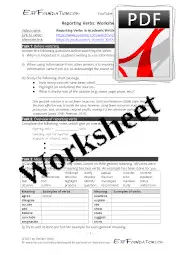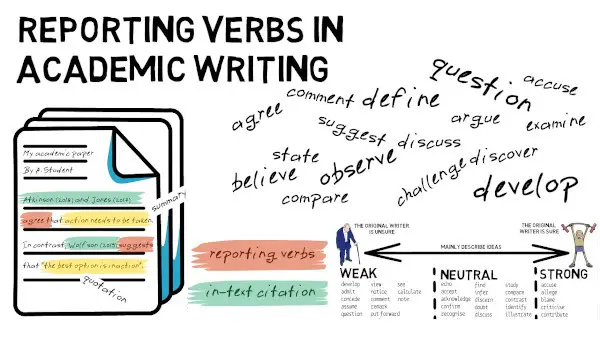Show AWL words on this page.
Show sorted lists of these words.


 







|
 Podcast is loading. Problems? Too slow? You can also access the Podcast by
clicking here.
Podcast is loading. Problems? Too slow? You can also access the Podcast by
clicking here.This message will disappear when then podcast has fully loaded.
In academic writing, you will need to cite (or 'refer to') other people's work or ideas. In order to do this accurately, you will need to use reporting verbs to link your in-text citation to the information cited. This section looks at what reporting verbs are, then looks at the strength and grammar of reporting verbs. Finally, there is a table which lists some of the most common reporting verbs, giving meaning, strength and usage. At the end there are some exercises to help you practice.
What are reporting verbs?


For another look at the same content, check out YouTube or Youku, or the infographic. There is a worksheet (with answers and teacher's notes) for this video.
Reporting verbs, also known as referring verbs, are verbs which are used when you report or refer to another writer's work. They are needed to connect the in-text citation to the information which you are citing. See the following examples, in which the reporting verbs (point out and state) are shown in bold.
- Sharpling (2012) points out that reporting verbs have subtle differences in meaning.
- University of Adelaide (2014) states that using the same reporting verb all the time is both repetitive and boring.
The most common reporting verb is state. However, while it is simpler to use the same verb over and over, this will not give your writing much variation. In addition, each reporting verb has a slightly different meaning, depending on what the writer you are citing is saying. It is therefore important for you to be aware of and try to use a range of reporting verbs, depending on the information you are citing.
Note that According to is another common way to refer to a writer's work. This is not a reporting verb, but is used in the same way. A common student mistake is to use this with a reporting verb such as state, which makes the sentence grammatically incorrect. See the following examples.
- According to Smith (2016), using According to and state in the same sentence is a common student error.
- Smith (2016) states that using According to and state in the same sentence is a common student error.
According to Smith (2016) states that using According to and state in the same sentence is a common student error.
Strength of reporting verbs
Reporting verbs vary in terms of strength. Consider the following examples.
- Smith (2016) assumes that reporting verbs have different strengths.
- Smith (2016) insists that reporting verbs have different strengths.
Although both verbs have the same general meaning, namely believe, the verb assume is quite weak, while the verb insist is much stronger. The second verb most closely matches the information above on this page, i.e. as a fact, and is therefore more accurate than the first one.
Grammar of reporting verbs
Reporting verbs are often followed by a that clause. However, not all verbs follow this pattern. It is important, when using reporting verbs, to check the grammar usage to make sure that your writing is accurate. Consider the following examples.
- Smith (2016) insists that reporting verbs have different strengths. [insist + that]
- Smith (2016) agrees with Sharpling (2012) that reporting verbs have subtle differences in meaning. [agree with sb]
- Smith (2016) challenges writers to use reporting verbs accurately. [challenge sb to do sth]
Note that it is usually acceptable to use reporting verbs in either the past or present tense. The present tense is more common as this brings the past research into the present and therefore makes it more current and important. There may, however, be special requirements for your course, so it is always useful to check the style guide for assignments.
Examples of usage for the most common reporting verbs are given in the table in the following section.
Examples of reporting verbs
The table below lists some of the most common reporting verbs. They are listed according to their general meaning. Usage and strength are also given. Verbs which are in the same cell have the same general meaning, usage and strength (e.g. admit and concede both mean agree, are both followed by that clauses, and are both weak verbs).
To aid in studying reporting verbs, frequency data for the verbs have been added, for two academic corpora: the BAWE (British Academic Written English), a 6.5 million word corpus of written academic English, and the academic section of the BNC Baby, a 1 million word sub-corpus of the BNC (British National Corpus). The frequencies given are total counts for the verbs and corresponding forms. Click on the buttons to show the frequencies.
There is another version of the list, sorted by frequency, on another page.
| General meaning | Reporting verb | Usage | Strength |
| accuse | accuse (197) (26) | sb of sth | strong |
| allege (70) (36) | that | strong | |
| blame (275) (31), criticise (425) (56) | sb for sth | strong | |
| add | develop (4034) (488) | weak | |
| contribute (1084) (96) | to sth | strong | |
| agree | admit (396) (119), concede (66) (18) | that | weak |
| echo (202) (15) | sth | neutral | |
| accept (1446) (269), acknowledge (535) (58), confirm (636) (80), recognise (1479) (245) | that | neutral | |
| endorse (69) (19), support (3810) (476) | sth | strong | |
| agree (929) (137) | that | strong | |
| concur (59) (7) | with sb | strong | |
| believe | assume (1601) (402) | that | weak |
| subscribe to (36) (4) | sth | neutral | |
| feel (3065) (248), hold (2260) (509), profess (26) (4) | that | neutral | |
| argue (3555) (480), believe (2837) (225), claim (2391) (379), insist (126) (29), maintain (1827) (136) | that | strong | |
| conclude | discover (735) (80), find (7578) (1233), infer (222) (34), discern (48) (11) | that | neutral |
| conclude (1142) (102) | that | strong | |
| disagree | question (3664) (796), query (10) (2) | sth | weak |
| doubt (557) (152) | sth | neutral | |
| disapprove (27) (11) | of sth | strong | |
| challenge (1224) (100) | sb to do sth | strong | |
| cast doubt on (16) (2), contradict (196) (8), discount (242) (16), dismiss (240) (35), disprove (73) (4), dispute (287) (116), oppose (687) (96), refute (118) (5), reject (690) (80), object to (1736) (120) | sth | strong | |
| deny (457) (80) | that | strong | |
| disagree (167) (14) | with sb | strong | |
| counter (360) (20) | strong | ||
| discuss | discuss (2044) (349) | sth | neutral |
| emphasise | highlight (1278) (53), underscore (13) (3) | sth | strong |
| emphasise (929) (139), stress (1514) (247) | that | strong | |
| examine | inquire (17) (8) | weak | |
| analyse (1821) (178), assess (895) (139), evaluate (743) (113), examine (1568) (272), investigate (940) (90), study (5566) (1105) | sth | neutral | |
| compare (2937) (383) | sth to sth | neutral | |
| contrast (1208) (211) | sth with sth | neutral | |
| scrutinise (54) (3) | sth | strong | |
| explain | identify (2643) (303), illustrate (1249) (198) | sth | neutral |
| define (2475) (354) | sth as sth | neutral | |
| articulate (101) (44), clarify (194) (28), explain (2629) (312) | that | neutral | |
| guess | speculate (52) (8), suppose (370) (161), suspect (315) (37) | that | weak |
| include | take into consideration (153) (2) | weak | |
| persuade | persuade (155) (40) | that | strong |
| convince (359) (44) | strong | ||
| require | stipulate (42) (5) | that | strong |
| see | view (3915) (663) | sth as sth | weak |
| notice (660) (99) | that | weak | |
| see (9515) (1480) | weak | ||
| observe (1517) (166) | that | neutral | |
| show | calculate (1812) (166) | that | weak |
| establish (2104) (295) | that | neutral | |
| demonstrate (1473) (187) | that/how | neutral | |
| prove (1681) (187), reveal (938) (100) | that | strong | |
| show (9860) (1205) | that/how | strong | |
| determine (2752) (339) | strong | ||
| state | comment (612) (123), note (2351) (402), remark (229) (64) | that | weak |
| describe (2659) (669), express (1280) (264), outline (519) (96), present (4514) (633) | sth | neutral | |
| add (2131) (290), declare (261) (47), inform (560) (57), mention (1384) (142), point out (792) (147), remind (179) (20), report (2996) (462), state (9264) (590) | that | neutral | |
| assert (464) (50) | that | strong | |
| suggest | put forward (174) (37) | sth | weak |
| imply (1046) (173), intimate (79) (12), suggest (4902) (695) | that | weak | |
| hypothesise (76) (6), posit (71) (6), postulate (69) (12), propose (1195) (161), theorise (75) (35) | that | neutral | |
| warn (224) (31) | sb of sth/that | strong | |
| advise (248) (24), advocate (378) (42), affirm (95) (5), recommend (448) (84), urge (83) (15) | that | strong | |
| think | consider (4723) (714) | sth | neutral |
| reflect (1491) (219) | that | neutral | |
| contend (137) (22), reason (3658) (496) | that | strong |
Checklist
Below is a checklist for this page.
| Item | OK? | Note/comment |
| I know what reporting verbs are. | ||
| I understand about the different strength of reporting verbs. | ||
| I understand about the grammar of reporting verbs. | ||
| I know a range of different reporting verbs and can use them accurately in my writing. |
References
Bailey, S. (2000). Academic Writing. Abingdon: RoutledgeFalmer
EIT Online (n.d.). Reporting Verbs. Available at: http://www2.eit.ac.nz/library/ls_guides_reportingverbs.html (Access date: 17/6/16)
Hampton, M. (n.d.). Writing about others’ work: verbs for citations (Harvard APA style). Available at: http://www.port.ac.uk/media/contacts-and-departments/student-support-services/ask/downloads/Verbs-for-citation.pdf (Access date: 17/6/16)
Sharpling, G. (2012). Reporting Verbs. Available at: https://www2.warwick.ac.uk/fac/soc/al/globalpad/openhouse/academicenglishskills/grammar/reportingverbs/ (Access date: 17/6/16)
University of Adelaide (2014). Verbs for Reporting. Available at: https://www.adelaide.edu.au/writingcentre/sites/default/files/docs/learningguide-verbsforreporting.pdf (Access date: 17/6/16)
Next section
Find out about avoiding plagiarism in the next section.
Previous section
Go back to the previous section about reference sections.
You need to login to view the exercises. If you do not already have an account, you can register for free.







